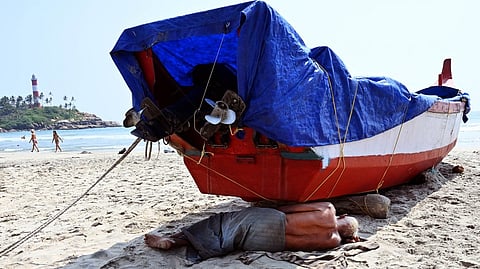

KOCHI: Kerala, once the leading state in seafood exports, has now slipped to fifth place, largely due to adverse ecological impacts, according to the Seafood Exporters Association of India (SEAI).
The association has urged immediate government intervention to mitigate the crisis threatening the livelihoods of over 1.4 million people in the state.
According to SEAI Kerala President M R Premachandra Bhat, Kerala's 590-kilometre coastline and nine coastal districts are experiencing a drastic reduction in fishing days, from around 300 to just 100 annually, due to adverse weather conditions, regulatory fishing bans, and the ongoing 52-day trawling ban effective until July 31.
The situation is further exacerbated by illegal fishing by foreign factory vessels from countries like China and Taiwan, which deplete local marine resources during restricted periods.
"We urgently need stronger coastal surveillance and regulatory enforcement. While our fishermen face strict restrictions, foreign vessels continue to plunder our seas unchecked," Bhat said.
He further highlighted the urgent need to boost domestic production. “Shrimp is the crown jewel of our exports. But without adequate raw material, even the most advanced processing facility becomes nothing more than a silent warehouse,” he warned, urging the government to promote commercial aquaculture and incentivise sustainable shrimp farming initiatives.
Another top priority, Bhat said, is the immediate rollout of Turtle Excluder Devices (TEDs) in trawl nets. These devices are not only vital for conserving marine resources but are also essential to maintain access to eco-conscious export markets like the United States.
“We have the technology. We have the necessary approvals. What we now need is administrative will—an urgent push to implement TEDs without further delay,” he stated.
Amidst rising global challenges—including freight disruptions, the Russia-Ukraine war, Middle East tensions, and instability along key shipping routes—India’s seafood exporters are under growing pressure to stay competitive against aggressive players like China, Vietnam, Indonesia, and Ecuador.
Despite these hurdles, Kerala’s industry continues to innovate, thanks in part to initiatives like the Plastic-Free Seas Project, where local fishermen collect marine plastic waste and bring it ashore for proper disposal.
“This is a model for the nation. It proves that sustainable practices and profitability can go hand in hand,” Bhat added.
Nearly 80% of Kerala’s fish processing workforce comprises skilled women, employed across over 850 peeling sheds and 100 processing units.
“When you support this industry, you're not just protecting exports—you’re empowering thousands of women and securing countless family incomes,” he said.
Recognising the sector as one of Kerala’s most significant women-oriented industries, SEAI stressed the need for uninterrupted employment opportunities throughout the year.
To achieve this, the association called for easier access to working capital loans, enabling the purchase of raw materials during peak seasons and allowing continued processing during lean months.
The association urged the government to leverage Kerala’s strong NRI-backed banking ecosystem to provide focused support for fish processing units.